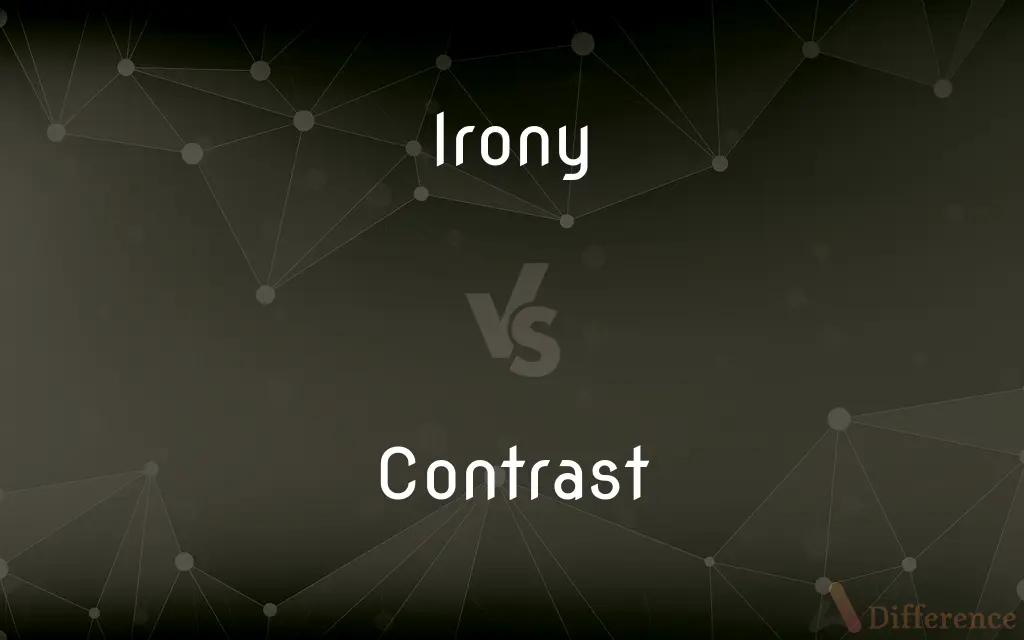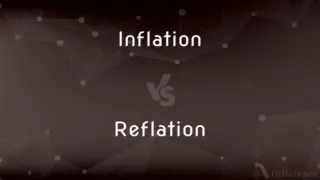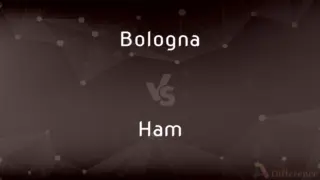Irony vs. Contrast — What's the Difference?

Difference Between Irony and Contrast
ADVERTISEMENT
Compare with Definitions
Irony
Irony (from Ancient Greek εἰρωνεία eirōneía 'dissimulation, feigned ignorance'), in its broadest sense, is a rhetorical device, literary technique, or event in which what on the surface appears to be the case or to be expected differs radically from what is actually the case. Irony can be categorized into different types, including verbal irony, dramatic irony, and situational irony.
Contrast
To set in opposition in order to show or emphasize differences
An essay that contrasts city and country life.
Contrasted this computer with inferior models.
Irony
The use of words to express something different from and often opposite to their literal meaning.
Contrast
To show differences when compared
Siblings who contrast sharply in interests and abilities.
A color that contrasted clearly with the dark background.
Irony
An expression or utterance marked by a deliberate contrast between apparent and intended meaning
"the embodiment of the waspish don, from his Oxbridge tweeds to the bone-dry ironies of his speech and prose" (Ron Rosenbaum).
ADVERTISEMENT
Contrast
(Linguistics) To evince a difference that can distinguish meaning
Voiced and voiceless stops contrast in English but not in Cree.
Irony
Incongruity between what might be expected and what actually occurs
"Hyde noted the irony of Ireland's copying the nation she most hated" (Richard Kain).
Contrast
The act of contrasting; a setting off of dissimilar entities or objects.
Irony
An occurrence, result, or circumstance notable for such incongruity
The ironies of fate. See Usage Note at ironic.
Contrast
The state of being contrasted
Red berries standing in vivid contrast against the snow.
Irony
Dramatic irony.
Contrast
A difference, especially a strong dissimilarity, between entities or objects compared
The contrast between Northern and Southern speech patterns.
Irony
Socratic irony.
Contrast
One thing that is strikingly dissimilar to another
My new school was a welcome contrast to the one before.
Irony
(rhetoric) The quality of a statement that, when taken in context, may actually mean something different from, or the opposite of, what is written literally; the use of words expressing something other than their literal intention, often in a humorous context.
Contrast
The use of opposing elements, such as colors, forms, or lines, in proximity to produce an intensified effect in a work of art.
Irony
(countable) An ironic statement.
Contrast
The difference in brightness between the light and dark areas of a picture, such as a photograph or video image.
Irony
Dramatic irony: a theatrical effect in which the meaning of a situation, or some incongruity in the plot, is understood by the audience, but not by the characters in the play.
Contrast
(Linguistics) A difference between units, especially one that distinguishes meaning.
Irony
Socratic irony: ignorance feigned for the purpose of confounding or provoking an antagonist.
Contrast
(countable) A difference in lightness, brightness and/or hue between two colours that makes them more or less distinguishable.
Irony
(informal){{cite-journal
Contrast
(uncountable) The degree of this difference.
The red and the orange don't have much contrast between them — I can hardly tell them apart.
Irony
Of or pertaining to the metal iron.
The food had an irony taste to it.
Contrast
(countable) A control on a television, etc, that adjusts the amount of contrast in the images being displayed.
Irony
Made or consisting of iron; partaking of iron; iron; as, irony chains; irony particles; - In this sense iron is the more common term.
Contrast
(countable) A difference between two objects, people or concepts.
Israel is a country of many contrasts.
Irony
Resembling iron in taste, hardness, or other physical property.
Contrast
(countable) Something that is opposite of or strikingly different from something else.
Irony
Dissimulation; ignorance feigned for the purpose of confounding or provoking an antagonist.
Contrast
Antithesis.
Irony
A sort of humor, ridicule, or light sarcasm, which adopts a mode of speech the meaning of which is contrary to the literal sense of the words.
Contrast
(transitive) To set in opposition in order to show the difference or differences between.
Irony
Witty language used to convey insults or scorn;
He used sarcasm to upset his opponent
Irony is wasted on the stupid
Satire is a sort of glass, wherein beholders do generally discover everybody's face but their own
Contrast
(intransitive) To form a contrast.
Foreground and background strongly contrast.
Irony
Incongruity between what might be expected and what actually occurs;
The irony of Ireland's copying the nation she most hated
Contrast
To stand in opposition; to exhibit difference, unlikeness, or opposition of qualities.
The joints which divide the sandstone contrast finely with the divisional planes which separate the basalt into pillars.
Irony
A trope that involves incongruity between what is expected and what occurs
Contrast
To set in opposition, or over against, in order to show the differences between, or the comparative excellences and defects of; to compare by difference or contrariety of qualities; as, to contrast the present with the past.
Contrast
To give greater effect to, as to a figure or other object, by putting it in some relation of opposition to another figure or object.
The figures of the groups must not be all on side . . . but must contrast each other by their several position.
Contrast
The act of contrasting, or the state of being contrasted; comparison by contrariety of qualities.
Place the prospect of the soulIn sober contrast with reality.
Contrast
Opposition or dissimilitude of things or qualities; unlikeness, esp. as shown by juxtaposition or comparison.
The contrasts and resemblances of the seasons.
Contrast
The opposition of varied forms, colors, etc., which by such juxtaposition more vividly express each other's peculiarities.
Contrast
The opposition or dissimilarity of things that are compared;
In contrast to
By contrast
Contrast
The act of distinguishing by comparing differences
Contrast
A conceptual separation or demarcation;
There is a narrow line between sanity and insanity
Contrast
The perceptual effect of the juxtaposition of very different colors
Contrast
The range of optical density and tone on a photographic negative or print (or the extent to which adjacent areas on a television screen differ in brightness)
Contrast
Put in opposition to show or emphasize differences;
The middle school teacher contrasted her best student's work with that of her weakest student
Contrast
To show differences when compared; be different;
The students contrast considerably in their artistic abilities
Share Your Discovery

Previous Comparison
Inflation vs. Reflation
Next Comparison
Bologna vs. Ham













































